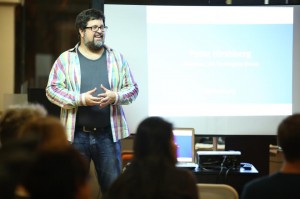I mean, surely Social Media is doing a lot for the cause, helping people spread the word via blogs, organize efforts and make everyone aware of our global climate crisis. Sarah Perez (love her stuff) even has a great post just today on How to Use Social Media for Social Change. Of course I agree, as evidenced by my early post on the Importance of Social Media and Amanda Chapel’s constant attacks against me (which I gleefully laugh at as he continues to give me more attention).
So what made me stop trying to fight my insomnia and get out of bed to write such a seemingly silly blog post at 430am this morning?
During the course of the work I have been doing with Intel lately, I have been researching the enterprise IT market and learning a lot about what they have been doing to reduce power consumption while maintaining performance across all there product lines. This CIO survey from March has some interesting details on “The Greening of IT”. It’s a very big and important topic for the industry and each of us. My friend Bill Kircos from Intel tells me that Intel is the largest buyer of reusable/renewable energy as ranked by the EPA (story on Treehugger.com). They are also extending their Greening Efforts across their operations in other important ways such as removing lead from their chips. Even my wife (Kristie Wells) is researching carbon offsets for her company Joyent.
At the same time, I have been thinking a lot about the big data portability issue (which I fully support) and whether or not the recent Facebook/Google challenge over Friend Connect might mean that we are seeing “The Twilight of the Open Web” (a topic of discussion for next months Social Media Club meeting in San Francisco – details to come).
In talking with some folks at the Executing Social Media conference last night, I mentioned this event idea and Nathan Gilliatt remarked we will always have some walled gardens and I replied with my standard “we can’t have walls, we need semi-permeable membranes”, meaning there needs to be some trust filter to keep the bad actors out and the good actors safe – which is the role Facebook claims to be playing in safegauding its users privacy from Friend Connect sites.
This is similar to the debate around Flickr and Zoomr and an open API for user portability which was basically about (paraphrasing) not allowing people to have all their data and photos transferred to a site where they may not be able to take it somewhere else in the future. As Stuart Butterfield said “we definitely should approve requests from direct competitors as long as they do the same … fair’s fair”. Or as Marc Canter infamously said at BloggerCon IV, “If you’re gonna suck, you gotta spit“.
Now look at the great and hugely popular service that FriendFeed and SocialThing are providing, a true value for sure, but it is duplicating, and in some cases tripling the amount of storage used for the same content.
Was also thinking about TubeMogul, which Tim Street mentioned during a session yesterday and which I also happen to love. It allows you to send your video to any and all of the video sharing sites you want all at once, saving us a great deal of time in distributing our video. Of course, there are also the people who take copies of it and upload it to other servers and other sites…
So these thoughts and discussions lead to me wondering about the impact that all of this data duplication we are creating with our Social Media is creating. Multiple hard drives, redundant systems, ultimately needing to head to a landfill or get partially recycled and replaced. Perhaps it is merely distributing the consumption we would have had anyway, but I have over 8,000 photos on Flickr and if I put them on Zoomr too that would be (@3MB each) 24 GB of extra storage space I am taking up on primary systems, plus backups – then the electricity to run it all.
Jake McKee talks about how he and his wife upload the same photos to their different Flickr accounts, what if they switched and then switched again. Of course, we also have a ton of different equipment we are using for creating and consuming media. Just today I had my M-Audio podcast rig, my Flip video camera, my phone and my iPod sitting in front of me next to my 3rd iBook/MacBook. The impact of manufacturing and disposal and power consumption of all this stuff we are using is just huge.
Of course, this is, most importantly, the method through which the whole of our society is improving, growing smarter and becoming more connected.
It’s obviously ok for the storage folks bottom lines and the power company and even me as a Social Media evangelist, but is Social Media bad for the environment? Shouldn’t we all be thinking more about Storage Conservation instead of Duplication?


#1 by Lisa - May 23rd, 2008 at 10:22
On the other hand, it’s better than using toxic chemicals to print out all those pictures and throw away the ones that didn’t come out
#2 by Clara - May 23rd, 2008 at 10:37
There are always tradeoffs, but I think the key word here is disruption. Those who work closely in the world of cleantech, social change and eco-change also say that they have to “disrupt” or challenge the standards of their individual industries. There are a lot of entrepreneurs there because those who see a problem see an opportunity to do something different.
I partly believe that More’s Law will take care of the problem, but I also strongly recommend that if you are experiencing internet fatigue should shut down the computer and go outside. Enjoy nature before it’s gone!
Oh, and Chris, as Social Media Club founder, maybe you could help to evangelize “shut down day” (http://www.shutdownday.org/)
#3 by Jason Falls - May 23rd, 2008 at 10:47
Very well done and interesting post, sir. I agree that some attention needs to be paid to consumption and the computing world, but I would focus our attentions on renewable energy sources so that the power supply for all things, not just computing, becomes the solution.
However, until efficient and affordable renewable energy is available to all, you are right in that we should consider our consumption. Mass duplication of information and resources certainly does consume more energy than would be taken if we streamlined our lives. Unfortunately, the capitalism of our market and the attention deficit nature of our over-saturated media experience will continue to dictate social network migration, fad-like attention to social media tools and, if the storage is free and the upload times aren’t excruciating, mass duplication of our online resources.
As a species, we’re not very smart sometimes.
What I would suggest in addition to discussions like this to promote consumption control, is an outreach to the resources providers. Brett Wilson at TubeMogul is brilliant, and a nice guy. While I don’t want to put words in his mouth, I’m sure he’d be interested in brainstorming ideas on how his service can improve to offer a more eco-friendly system. And he’s a relative pebble in the pond. Yahoo, Google and other conglomerates that gobble up tools and try to streamline everything for profits out to be put on notice and asked to streamline them for the Earth as well.
The good news is that the conversation has started. Now we have to find ways to get it in front of the right people. Perhaps your folks at Intel can help.
My two tree-hugging cents.
#4 by Tim Street - May 23rd, 2008 at 10:47
Just like we need to be aware of the “Snake Oil” salesmen in Social Media we also need to keep an eye out for the “Green Oil” salesmen of the Green movement.
#5 by Chris Heuer - May 23rd, 2008 at 12:04
Lisa – not sure about the balance there really, but thats a great point of comparison
Clara – thanks for the headsup – just tweeted it – email me through 4chrisheuer at big G email provider with more info on how we can help – would gladly welcome a guest blog post on SMC too
Jason – really, really great addition to the conversation – but it is important to focus on consumption side as well – this is the big thing around ‘vampire energy’ of stand by mode – do you know about this? Great chart from Good magazine http://awesome.goodmagazine.com/transparency/008/trans008vampireenergy.html
Tim – always true point – if you meet the buddha on the road… must evaluate everything for yourself and consider the sources
#6 by Marcel LeBrun - May 23rd, 2008 at 13:00
Chris,
I was thinking about this very thing the other day and I think you bring up an excellent point. I would love to see someone put some math behind it.
The issue isn’t so much duplicate storage, but rather the vast number of different services all with major computing infrastructure that generate heat and consumer power. The faster CPUs (Moore’s law mentioned above) make matters worse in that a single rack of computers now produces much more heat (and consumes more power) than it did in the past.
Intel and companies like Dell who has introduced regeneration and is focusing on lowering power consumption are undertaking very important work.
At Radian6, for example, each computing rack we have consumes about to $450/month in electricity. It isn’t the storage (or even the bandwidth), but the CPU cycles for processing that drives the cost. Now when you divide that up on a per user basis it isn’t much (a lot less than your laptop), but add a slice of energy for every service you use on the internet and you probably carry a bigger energy footprint than you would expect.
That’s why I also like where the industry is going with Cloud Computing. If it is done well, we should get better reuse, reduce duplication and save energy.
Glad you raised this.
Marcel
#7 by Jason Falls - May 23rd, 2008 at 14:03
Chris – Hadn’t seen the vampire mode chart. Very good resource. I’m certainly not saying to ignore consumption, particularly until we can find reliable alternate energy resources. But I’d rather see us focus there and secondarily find ways to conserve in the meantime. It’s kind of like cancer … do I want us to find a cure or find treatments. Well, both, but which is more impactful?
#8 by david - June 4th, 2008 at 23:51
This is really very interesting. It was either a poscast I found or a story I just heard on NPR, but the IT industry has always focused so much on getting more computing power in a smaller space – never any concern for power consumption, and data centers are becoming obsolete because they can’t handle the power needed by today’s servers. That tells you how much power is being used. Think of the carbon going into the atmosphere to generate all that power for – as you keenly point out – redundant information.
#9 by Thousassy - March 7th, 2009 at 21:49
продам Форд-Фокус 2008 года за 200 тр. торг возможет. срочно!!!
+7 960 200 9209